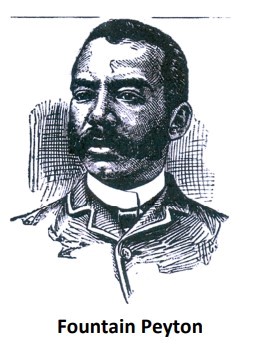Fountain Peyton
Many enslaved people lived in Stafford, but the names of most have been lost to history. A number of those who were able to leave the county and settle in Washington or elsewhere became successful. Fountain Peyton was one such man. Born enslaved in Stafford, he became a successful attorney in Washington, DC.
Fountain Peyton, the son of Wingfield Peyton and Mary (Whiting) Peyton (born c.1838). Mary was born and raised in the Clift and Moncure families. When she was about twenty years of age, a death in her enslaver’s family resulted in her being sold to an enslaver who sent her to Richmond preparatory to shipping her to the Red River territory by way of New Orleans. Separated from her home and family, all seemed lost until she was informed that Benjamin Wamsley, who lived in the general vicinity of her former home in Stafford, had purchased her. She was brought back to Stafford and reunited with her family and friends. About a year later, she married Wingfield Peyton. He had been born on the Wamsley plantation. Fountain was born there in 1861.
During the Civil War, Fountain’s father was taken south by the Confederates. Mary seized the opportunity to escape to Washington, taking little Fountain with her. Arriving in Washington, they were classed by the Union army as “Contrabands of war.” Mary and Fountain endured all the hardships that befell the other contrabands who came there under like circumstances. Nothing more is known of Mary Peyton.
At age six, Fountain commenced school in Washington and proved to be an exceptionally bright child. As he grew older, he partially supported himself by selling newspapers. His ambition from childhood was to become a lawyer. After eight years of public school, he entered Wayland Seminary, a school established by the Baptist Home Mission Society. He paid his fees by teaching grammar and mathematics there.
Subsequently, he was accepted at Howard University, but soon discovered that while competent in math and English, he didn’t have enough training in the classical languages. Fountain left Howard and became a teacher at Leonardtown, Maryland, a position he held for five years. Presumably, he used this time to become familiar with those subjects he was lacking. Fountain then passed his Civil Service exam and took a job as a letter carrier in Washington. He reapplied to Howard University and was accepted into the law program there. His job with the post office took most of his time and he struggled to attend class and study. “Even the lecture hour was the hour for collecting mail; but he would remain to hear the lecture, then seize his mailbag and run all over the route in order to get in at the post office on schedule.”
On April 26, 1890 Fountain graduated from Howard, third in his class of fourteen. He immediately opened an office and commenced his law practice. One of about three Negro attorneys in the District of Columbia at that time, he quickly became noted as a successful criminal defense lawyer. Fountain was the first black lawyer to argue a case in the Court of Appeals of the District of Columbia and was the first black Examiner in Chancery for Washington. He was appointed to the city’s School Board in 1915 and by 1918 was chairman. He served on the board until at least 1919.

